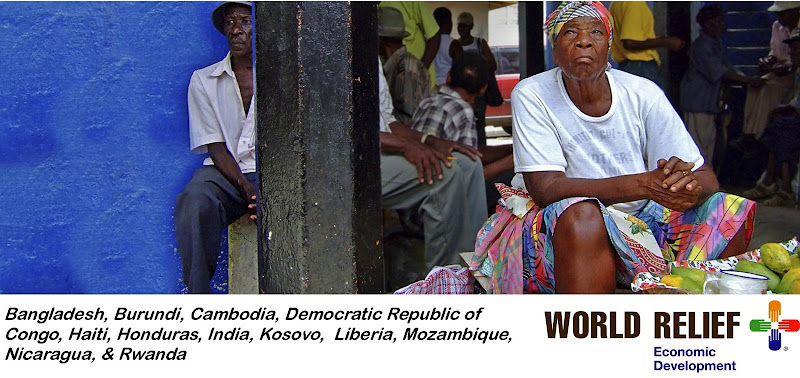Today, our team from World Relief and Faraja Trust visited two groups within the Kware slum of the Ongata Rongai area, just about 30 minutes from the center of Nairobi, Kenya. Kware is like many of the slums of Nairobi, though likely not as large and with conditions not quite as destitute as some of the those around the city center. It is a place that cars can pass through rather easily, as long as you’re able to dodge the pedestrians, bicyclists, and various forms of animal life that crowd its bumpy dirt roads. The animal life roaming around Kware slum includes ducks, chickens, goats, dogs, and donkeys. Children are at play among muddy dirt paths and as our car rolls past them and they see the “muzungu” (white person) in the car they shout out emphatically “How are you?” over and over… The only 3 words of English they know. The HIV epidemic has hit this community hard, and as a result, HIV “Voluntary Counseling and Testing Centers” and health clinics have sprung up and are interspersed among the many butcheries, hair salons, and soda shops. The main road into Kware is like a huge shopping mall of stalls selling everything from Croc-like sandles to underwear to vegetables to small household gadgets.
Our first stop is the Kware Vision savings group. Composed of 20 members, all women, Kware Vision meets in a small one room structure which they rent for 400 Kenya Shillings per hour (about $5) from a private resident of the area. The group meets every Tuesday to receive training in the methodology and to contribute their savings. So excited about the prospect of savings and accessing loans from each other, the group began saving from the very first meeting. To date, they have saved 7,000 Kenya Shillings ($91). The minimum contribution a member makes to the savings fund each week is 50 Shillings, just under $1.
The group’s chairperson, one of the older members of the group, regally wrapped in a shawl and wearing an expression of pride on her face, greets us and stands as she explains how the group is doing. She explains that this concept they have been taught is simple, and it has been easy to see how they will grow as they save and work together. They had heard many times of microfinance institutions in the area, but had never had access to them. But now, they are using their own resources to give loans to each other, and creating a “Social Fund” that they will use to support each other in times of emergency.
On this day of our visit, the group is completing their last initial training session with Martin, a volunteer of Faraja who is acting as a community agent for mobilizing and training Faraja’s savings groups. Martin teaches them today about the “Daily Savings” concept. With Daily Savings, they can save even in-between meetings by taking their money to the box keeper to slip into the small slot on the top of the lock box, in exchange for a token that they bring to the next meeting to exchange for a stamp in their passbook. The group listens intently as they listen to Martin’s teaching, and they agree that this element will help further their discipline in saving the cash that they bring in, helping to prevent their spending it on items they don’t need or could do without.
After our visit to Kware, we head over to another part of the slum where we meet the “Best Ladies” savings group. When I heard the name “Best Ladies”, I assumed that it would be a group of all women. But alas, one man, James, has recently joined the group after seeing how the group functions to support one another and create needed access to financial services. He is a vibrant, good-spirited fellow, who when introducing himself to us, says in very clear English “When I come here, I am part of the ‘Best Ladies’, but when I go out, I am still a gentleman!” We all laugh at his good humor. James is the Box Keeper of the group, and he sits at the front with the other leadership committee members supporting the financial transactions that take place during the meeting. He reports to us that “This group is doing very well, but we know it is not from our own efforts, but from our Almighty God who provides for us.”
Best Ladies has been meeting every Tuesday since January 26th. Each week, they all contribute 20 Shillings, about $0.30, and their fund continues to grow larger each week. They have begun taking loans, and they enforce strict fines when a member is late to a meeting, misses a meeting, or is late on loan repayment. A small plastic basket sits on a chair right by the door of the entrance to their meeting room with the label “Fine” on it. When a member comes in late, they are obligated to drop 5 Shillings into the basket. They take seriously the rules of their group’s constitution, and they observe the meeting’s activities that day intently.
On Thursday of this week, we will visit more groups in a more rural area of the Kajiado district. It is incredible to see how the program is progressing, how the demand for training is keeping our Faraja team in a constant state of planning and strategizing in how they can meet the demand. It is a good problem to have, as it shows how willing and able materially poor communities in the developing world are to address their own poverty, and work in community to grow together.
Wendy
Tuesday, March 9, 2010
My Visit to the Savings Groups of Kware Slum
Subscribe to:
Post Comments (Atom)






No comments:
Post a Comment